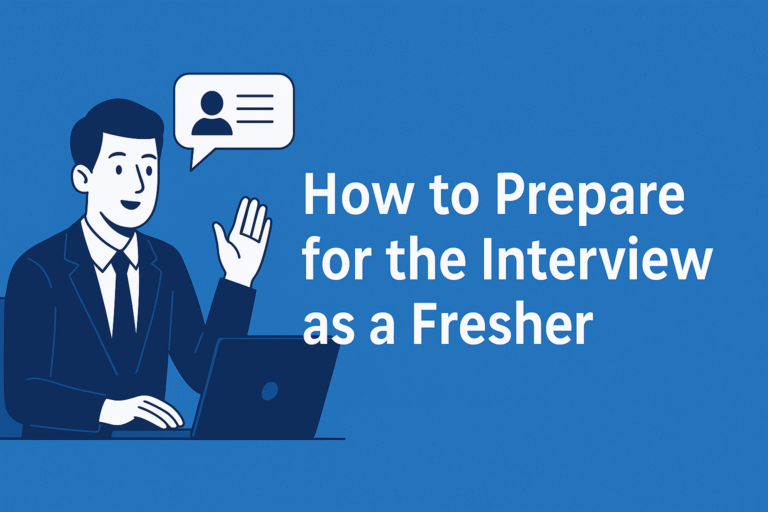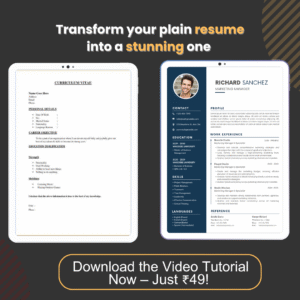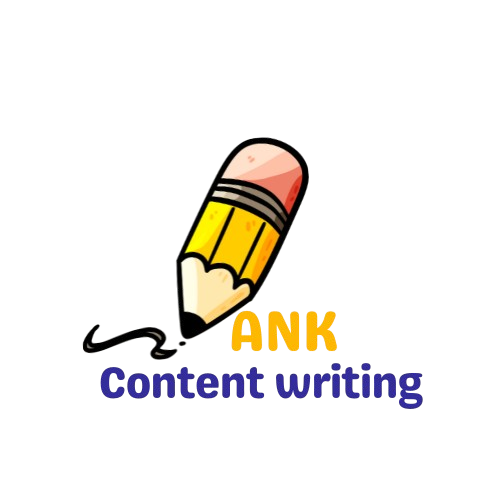
Preparing for your first interview can be exciting as well as nerve-wracking. As a new candidate, you may not have much work experience, but with the right preparation, you can impress the interviewer and stand out.
In this blog, you will find answers to some of the most frequently asked interview questions and some tips on how to stand out in an interview Here’s a step-by-step guide with examples to help you prepare confidently.
Table of Contents
1. Review the Job Description
Even before you go for an interview, you should know what the company is looking for. The job description is your guide; it tells you what skills and qualifications are needed for the role
How to Prepare:
- Carefully read the job description
- Focus on skills that complement your strong points.
- Consider situations where you have applied those skills in your extracurricular activities, internships, or academic projects.
- For instance, if the JD states, “Ability to work in a team and meet deadlines,” you may think back to your senior project, in which you collaborated with classmates to deliver work before the deadline.
2. Research and Know About the Company
“What do you know about our company?” This is a common question asked by interviewers. This is your opportunity to show your true interest. Before going into any interview, researching the company helps you tailor your answers to the company’s goals.
How to prepare:
- Visit the company’s website to read about their services, values, and recent achievements.
- Check their LinkedIn page for updates and employee posts.
- Look for recent news articles or press releases about the company.
Example: If you’re interviewing for TCS, you might say, “I’ve read that TCS is focusing on expanding AI solutions for global clients. I’m excited to see how my interest in machine learning can be helpful.”
3. Organise Your Documents
Even though you have the best answers in the world, it won’t look professional if you’re fumbling with papers while the interview is going on. Keeping your paperwork organized shows your seriousness and preparation.
How to prepare:
- Have four or five copies of your most recent resume on hand.
- Organize ID proofs, certificates, and mark sheets in a neat file.
- Include any available internship certificates or recommendation letters.
Example: If the interviewer asks you, “Can I see your internship certificate?” you should be able to quickly pull out your internship certificate without wasting any time.

4. Dress Formally
Before you even say a word, your appearance makes an impression. Respecting the opportunity can be seen by professional attire.
How to prepare:
- Select formal, basic attire in subtle colors such as black, white, grey, or navy blue.
- Avoid strong perfumes, heavy makeup, and gaudy prints.
- Make sure your clothes are ironed and clean.
- For instance, a light blue shirt, dark pants, and black shoes are appropriate for men.
- For women: A simple kurti with a few accessories or a white shirt with black pants
5. Prepare for a Mock Interview
It takes practice to become confident. You can become more comfortable answering questions without fumbling by practicing with a mock interview.
How to prepare:
- Get a mentor, senior, or friend act as the interviewer.
- Practice common questions such as “What are your strengths?” “Tell me about yourself,” and “Why should we hire you?”
- To check your clarity, speed, and tone, record yourself.
- For instance, after practicing, you may find that you talk too quickly when you’re anxious, which will allow you to speak more slowly in the actual interview.
6. Be Punctual
Even if your responses are flawless, being late makes a bad impression.
How to prepare:
- Plan your route and check the location beforehand.
- Set extra time for delays or traffic.
- Try to get there ten to fifteen minutes early.
- For instance, aim to arrive by 9:45 AM if your interview is scheduled for 10 AM. Additionally, it allows you to relax and rejuvenate.
7. Maintain Positive Body Language
Your body language, gestures, and facial expressions convey just as much information as your spoken words.
How to prepare:
- Keep your hands relaxed and sit up straight.
- Don’t stare, but keep eye contact.
- When you greet or express gratitude to the interviewer, smile naturally.
- For instance, when responding, lean forward a little to demonstrate interest, but refrain from crossing your arms or tapping your foot, as these gestures can come across as defensive.
8. How to Introduce Yourself in an Interview as a Fresher
The way you introduce yourself sets the tone for the rest of the conversation. Keep it short, relevant, and confident.
How to prepare:
- Start with your name and educational background.
- Mention accomplishments and skills that are relevant to the position.
- Finish with your professional goal.
Example: “Good morning, I’m Riya Sharma. I recently completed my B.Com from Delhi University, where I developed strong analytical and problem-solving skills through projects and internships. I’m eager to start my career in finance and contribute to innovative projects.”
🎯 Want to learn how to create a professional LinkedIn profile and write a stunning resume using ChatGPT?
👉 Download our step-by-step video tutorial now for just ₹49!
9. What Are Your Strengths
Interviewers can see how you can contribute by asking this question.
How to prepare:
- Pick two or three job-related strengths.
- Give a brief example to back each up.
- For instance: “I pay attention to details. I was in charge of data analysis for my senior project, and I made sure the final report had no mistakes.
10. Why Should We Hire You
Interviewers want to know why you’re better than other candidates.
How to prepare:
- Emphasise skills, willingness to learn, and enthusiasm.
- Avoid generic answers like “I’m hardworking.”
Example: “I may be a fresher, but I’m a fast learner and adaptable. I’m confident that my problem-solving skills and eagerness to grow will help me contribute effectively to your team.”
11. What Interests You About This Role
This question helps the interviewer see if your career goals match the role. If your interest feels genuine and aligned with their work, you’ll have an advantage.
How to prepare:
- Think about what excites you in the job description.
- Relate it to your skills and future goals.
Example: “I’m passionate about digital marketing, and this role offers the opportunity to work on real campaigns. It’s a great match for my career goal of becoming a creative strategist.”
12. Answer Common Interview Questions (Using the STAR Method)
Many interviewers prefer structured answers. The STAR method helps you explain situations clearly without going off track.
STAR stands for:
- Situation – Brief background of the event
- Task – Your responsibility
- Action – Steps you took
- Result – Positive outcome
Example: “During my college fest (Situation), I was responsible for managing sponsorships (Task). I approached local businesses, pitched our event benefits, and followed up regularly (Action). We secured 10 sponsors, increasing our budget by 30% (Result).”
13. What Motivates You
Interviewers want to understand what drives you to do your best.
How to prepare:
- Think about moments when you felt inspired to work hard.
- Avoid generic answers like “money” or “success” — focus on personal growth or challenges.
Example: “I’m motivated by learning new skills. For instance, during college, I taught myself Canva design to help my club create more attractive posters, which doubled our event registrations.”
14. How to Handle Stress
Every job has stressful moments. Your ability to manage them shows maturity.
How to prepare:
- Share a real-life example.
- Explain the steps you take to stay calm and productive.
Example: “During my final semester, I had multiple projects due in the same week. I made a detailed schedule, prioritised tasks, and broke work into smaller steps. This helped me meet all deadlines without sacrificing quality.”
15. What Are Your Hobbies
Your hobbies can give interviewers insight into your personality.
How to prepare:
- Choose hobbies that reflect positive qualities like discipline, creativity, or teamwork.
- Avoid hobbies that could seem irrelevant or unprofessional.
Example: “I enjoy writing blogs, which helps me improve my communication skills and keeps me updated with trends.”
16. What Are Your Salary Expectations
As a fresher, your main focus should be on learning, but you should also know your worth.
How to prepare:
- Research average salaries for freshers in your field.
- Be flexible and avoid giving a fixed number unless asked directly.
Example: “I’m open to the industry standard for freshers. My priority is to gain experience and contribute to the company’s success.”
17. Address the Interviewer Politely
Courtesy leaves a lasting impression.
How to prepare:
- Greet politely: “Good morning, Sir/Madam”.
- Use respectful phrases like “May I…” or “Thank you for…”.
Example: Instead of saying, “What’s next?”, say, “May I know what the next step in the interview process will be?”
18. Do You Have Any Questions
When they ask this, don’t say “No.” It’s your chance to show curiosity and interest.
How to prepare:
- Prepare 2–3 smart questions about the role or company.
Example: “What does success look like in this role within the first six months?”
“How does the company support employee learning and growth?”
19. Follow Up with HR
A thank-you message after the interview can make you stand out.
How to prepare:
- Send an email within 24 hours.
- Keep it short and positive.
Example Email:
“Dear [HR’s Name],
Thank you for giving me the opportunity to interview for the marketing executive role. I enjoyed our conversation and learning more about the company. I look forward to the possibility of working together.
Best regards,
[Your Name]”
20. Keep a Positive Mindset for Future Opportunities
Not every interview will end with a job offer — and that’s perfectly fine. Instead of seeing a rejection as a failure, treat it as a stepping stone toward your ultimate goal. Every interview you attend is an opportunity to practice, learn, and improve. After each one, take a moment to reflect on what went well and where you can do better. Perhaps you felt confident in your introduction but stumbled on a technical question — use that as fuel to sharpen your knowledge for the next time. Keep developing your skills, expanding your knowledge, and applying for new opportunities with the same enthusiasm. Remember, each “no” is simply guiding you closer to the right “yes,” and the persistence you show now will one day become part of your success story.
